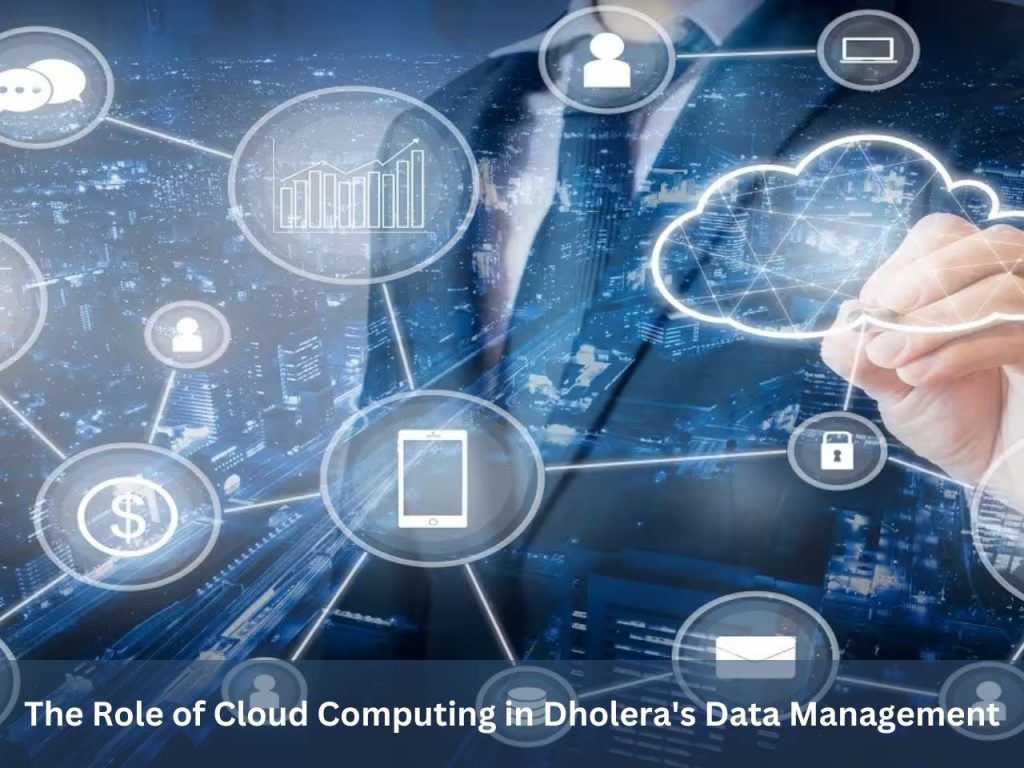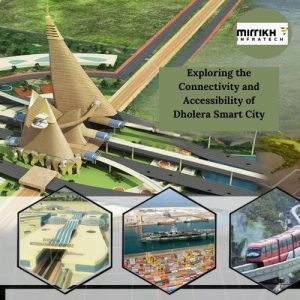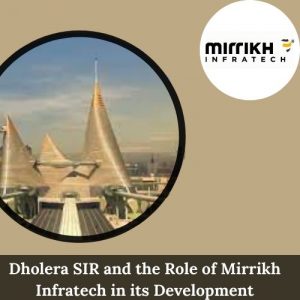The emergence of smart cities represents a significant leap forward in urban development, with Dholera Smart City in Gujarat, India, standing out as a pioneering example. Designed to be a hub of innovation, efficiency, and sustainability, Dholera is a testament to India’s commitment to futuristic urban planning. Central to the success of this smart city is the effective management of vast amounts of data generated daily. Enter cloud computing: a technological marvel that plays a pivotal role in Dholera’s data management strategy. In this blog, we will explore how cloud computing is revolutionizing data management in Dholera, ensuring that the city remains at the forefront of smart city initiatives globally in Mirrikh Infratech
Understanding Cloud Computing
Cloud computing refers to the delivery of various services over the Internet, including storage, computing power, databases, networking, software, and analytics. It offers flexibility, scalability, and efficiency, making it an indispensable tool for modern data management. By leveraging the cloud, organisations can access and store data on remote servers, reducing the need for local storage and enhancing accessibility.
The Data Challenge in Dholera
Dholera Smart City envisioned as a model for future urban development, is designed to be a high-tech hub with advanced infrastructure and facilities. This ambitious project involves integrating various systems, such as transportation, utilities, healthcare, and governance, all of which generate massive amounts of data. Managing this data effectively is crucial for the city’s seamless operation and continuous improvement.
Key Data Management Challenges:
- Volume and Variety: The sheer volume and variety of data generated in a smart city are staggering. From sensor data and traffic patterns to energy consumption and healthcare records, Dholera’s data landscape is vast and diverse.
- Speed and Real-time Processing: Smart cities rely on real-time data processing to make informed decisions. For instance, traffic management systems need instant data to optimize flow and reduce congestion.
- Security and Privacy: Handling sensitive information, such as personal health records and financial data, requires robust security measures to protect against breaches and unauthorized access.
- Scalability: As the city grows and evolves, its data management system must be scalable to accommodate increasing data volumes and new applications.
Cloud Computing to the Rescue
Cloud computing addresses these challenges by offering a range of benefits that align perfectly with the needs of a smart city like Dholera.
1. Scalability and Flexibility
Cloud computing provides unparalleled scalability, allowing Dholera to scale its data management infrastructure up or down based on demand. This flexibility ensures that the city can efficiently handle fluctuations in data volume without investing in costly hardware. As the city’s population and data needs grow, the cloud infrastructure can seamlessly expand to accommodate the increased load.
2. Cost Efficiency
By leveraging cloud services, Dholera can significantly reduce its capital expenditure on physical infrastructure. Cloud providers offer pay-as-you-go models, enabling the city to pay only for the resources it uses. This cost-effective approach allows Dholera to allocate funds to other critical areas, such as education, healthcare, and transportation.
3. Real-time Data Processing
Cloud computing enables real-time data processing, a critical requirement for smart cities. With the ability to process and analyze data on the fly, Dholera can make swift, data-driven decisions. For example, real-time traffic data can be used to optimize traffic signals, reduce congestion, and enhance public transportation efficiency.
4. Enhanced Security
Security is a top priority in cloud computing. Leading cloud service providers invest heavily in robust security measures, including encryption, multi-factor authentication, and regular security audits. Dholera can leverage these advanced security features to protect its data from cyber threats and ensure the privacy of its residents.
5. Disaster Recovery and Data Backup
Cloud computing offers robust disaster recovery and data backup solutions. In the event of a system failure or natural disaster, Dholera’s data can be quickly restored from the cloud, ensuring continuity of essential services. This resilience is vital for maintaining the city’s operations and minimizing downtime.
6. Integration and Interoperability
Smart cities rely on the seamless integration of various systems and applications. Cloud computing facilitates this integration by providing standardized APIs and platforms that enable different systems to communicate and share data effortlessly. This interoperability ensures that Dholera’s diverse data sources can work together harmoniously.
Practical Applications of Cloud Computing in Dholera
1. Smart Utilities
Dholera’s utility management systems, including water, electricity, and waste management, generate vast amounts of data. Cloud computing allows these systems to collect, store, and analyze data in real time. For example, smart meters can provide real-time energy consumption data, enabling residents to monitor and optimize their usage. Similarly, water management systems can detect leaks and monitor water quality, ensuring efficient resource utilization.
2. Intelligent Transportation for Mirrikh Infratech
Dholera’s transportation infrastructure relies on cloud computing to manage traffic, public transportation, and parking. Real-time data from traffic cameras, sensors, and GPS devices is processed in the cloud to optimize traffic flow, reduce congestion, and enhance public transit efficiency. Cloud-based platforms can also provide residents with real-time information on bus and train schedules, improving the overall commuting experience.
3. Healthcare and Telemedicine
Cloud computing plays a vital role in Dholera’s healthcare sector by enabling telemedicine and remote patient monitoring. Electronic health records (EHRs) are stored securely in the cloud, allowing healthcare providers to access patient information from anywhere. This accessibility enhances the quality of care and enables timely interventions. Additionally, telemedicine platforms powered by the cloud facilitate virtual consultations, reducing the need for in-person visits and improving healthcare access for residents.
4. Governance and Citizen Services
Dholera’s smart governance initiatives leverage cloud computing to provide efficient and transparent services to residents. Cloud-based platforms enable online service delivery, such as issuing permits, paying taxes, and accessing public records. These platforms enhance citizen engagement and streamline administrative processes, making governance more efficient and responsive.
5. Environmental Monitoring
Dholera’s commitment to sustainability is supported by cloud-based environmental monitoring systems. Sensors placed throughout the city collect data on air quality, noise levels, and weather conditions. This data is processed in the cloud to monitor environmental parameters in real time. The city can then take proactive measures to mitigate pollution and ensure a healthy living environment for its residents.
The Future of Cloud Computing in Dholera
As Dholera continues to evolve, the role of cloud computing in its data management strategy will only become more prominent. The city’s commitment to innovation and sustainability aligns perfectly with the capabilities of cloud technology. Here are some future trends to watch for:
1. AI and Machine Learning Integration
The integration of artificial intelligence (AI) and machine learning (ML) with cloud computing will unlock new possibilities for Dholera. AI and ML algorithms can analyze vast amounts of data to identify patterns, predict trends, and optimize city operations. For instance, predictive analytics can help forecast traffic patterns, enabling proactive traffic management.
2. Internet of Things (IoT) Expansion
The proliferation of IoT devices in Dholera will generate even more data, necessitating advanced cloud solutions. Cloud computing will serve as the backbone for IoT ecosystems, facilitating data collection, processing, and analysis. This integration will enhance the city’s ability to monitor and manage various aspects of urban life, from energy consumption to public safety.
3. Edge Computing
Edge computing, which involves processing data closer to the source rather than relying solely on centralized cloud servers, will play a crucial role in Dholera’s future. This approach reduces latency and enhances real-time data processing capabilities. For example, edge computing can enable faster response times for autonomous vehicles and smart traffic systems.
4. Blockchain for Data Security
Blockchain technology can be integrated with cloud computing to enhance data security and transparency. By creating immutable records of transactions and data exchanges, blockchain can prevent unauthorized access and ensure data integrity. This technology is particularly valuable for sensitive applications, such as healthcare and governance.
Conclusion
Dholera Smart City’s vision of a technologically advanced, sustainable, and efficient urban environment is being realized through the strategic use of cloud computing. By addressing the challenges of data volume, speed, security, and scalability, cloud computing empowers Dholera to harness the full potential of its data. From smart utilities and intelligent transportation to healthcare and governance, cloud computing is the backbone of Mirrikh’s data management strategy.




